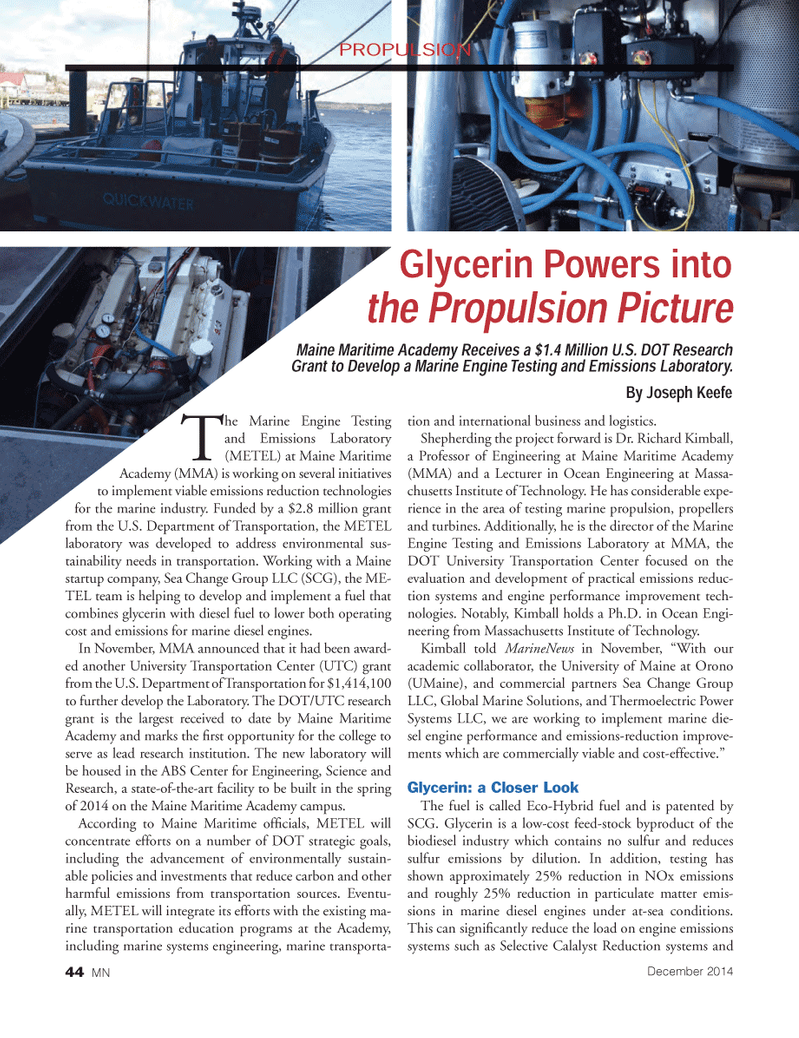
Page 44: of Marine News Magazine (December 2014)
Salvage & Spill Response
Read this page in Pdf, Flash or Html5 edition of December 2014 Marine News Magazine
The Marine Engine Testing and Emissions Laboratory (METEL) at Maine Maritime Academy (MMA) is working on several initiatives to implement viable emissions reduction technologies for the marine industry. Funded by a $2.8 million grant from the U.S. Department of Transportation, the METEL laboratory was developed to address environmental sus- tainability needs in transportation. Working with a Maine startup company, Sea Change Group LLC (SCG), the ME- TEL team is helping to develop and implement a fuel that combines glycerin with diesel fuel to lower both operating cost and emissions for marine diesel engines.In November, MMA announced that it had been award- ed another University Transportation Center (UTC) grant from the U.S. Department of Transportation for $1,414,100 to further develop the Laboratory. The DOT/UTC research grant is the largest received to date by Maine Maritime Academy and marks the Þ rst opportunity for the college to serve as lead research institution. The new laboratory will be housed in the ABS Center for Engineering, Science and Research, a state-of-the-art facility to be built in the spring of 2014 on the Maine Maritime Academy campus. According to Maine Maritime ofÞ cials, METEL will concentrate efforts on a number of DOT strategic goals, including the advancement of environmentally sustain- able policies and investments that reduce carbon and other harmful emissions from transportation sources. Eventu- ally, METEL will integrate its efforts with the existing ma- rine transportation education programs at the Academy, including marine systems engineering, marine transporta- tion and international business and logistics. Shepherding the project forward is Dr. Richard Kimball, a Professor of Engineering at Maine Maritime Academy (MMA) and a Lecturer in Ocean Engineering at Massa- chusetts Institute of Technology. He has considerable expe- rience in the area of testing marine propulsion, propellers and turbines. Additionally, he is the director of the Marine Engine Testing and Emissions Laboratory at MMA, the DOT University Transportation Center focused on the evaluation and development of practical emissions reduc- tion systems and engine performance improvement tech- nologies. Notably, Kimball holds a Ph.D. in Ocean Engi- neering from Massachusetts Institute of Technology. Kimball told MarineNews in November, ÒWith our academic collaborator, the University of Maine at Orono (UMaine), and commercial partners Sea Change Group LLC, Global Marine Solutions, and Thermoelectric Power Systems LLC, we are working to implement marine die- sel engine performance and emissions-reduction improve- ments which are commercially viable and cost-effective.Ó Glycerin: a Closer LookThe fuel is called Eco-Hybrid fuel and is patented by SCG. Glycerin is a low-cost feed-stock byproduct of the biodiesel industry which contains no sulfur and reduces sulfur emissions by dilution. In addition, testing has shown approximately 25% reduction in NOx emissions and roughly 25% reduction in particulate matter emis- sions in marine diesel engines under at-sea conditions. This can signiÞ cantly reduce the load on engine emissions systems such as Selective Calalyst Reduction systems and PROPULSIONGlycerin Powers into the Propulsion Picture Maine Maritime Academy Receives a $1.4 Million U.S. DOT Research Maine Maritime Academy Receives a $1.4 Million U.S. DOT Research Grant to Develop a Marine Engine Testing and Emissions Laboratory. Grant to Develop a Marine Engine Testing and Emissions Laboratory. By Joseph Keefe By Joseph Keefe December 201444 MNMN Dec14 Layout 32-49.indd 44MN Dec14 Layout 32-49.indd 4411/25/2014 11:09:53 AM11/25/2014 11:09:53 AM

 43
43

 45
45
